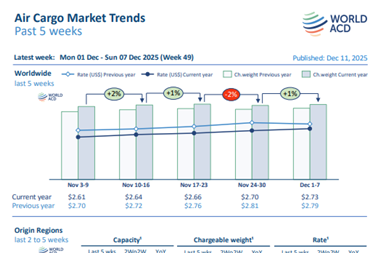DHL Global Forwarding is the latest freight forwarder to see airfreight demand and revenues surge during the second quarter, but margins were under pressure as a result of increasing airfreight rates.
The Deutsche Post-owned forwarder saw second-quarter airfreight revenues increase by 5.7% year on year to €1.1bn on the back of a 9.7% increase in demand to 556,000 tonnes.
The overall airfreight market is estimated to have increased by 9-10% during the period.
However, airfreight gross profits declined by 10.6% against last year to €210m as rates increased.
There is often a lag between airfreight rates increasing and a forwarder’s ability to pass these price increases onto customers.
It was a similar story for the company’s seafreight business and as a result overall forwarding revenues in the quarter were up 5.5% to €3.6bn and earnings before interest and tax (ebit) slipped 2.9% to €67m.
“Air and ocean freight revenues and volumes grew significantly in the first half of 2017.
“[Air]freight rates in Asia remained nearly unchanged at a level comparable with the peak season of the fourth quarter of the previous year.
“Due to our contract structures airfreight price increases can only be passed on to customers with a delay.
“As a result, revenue for the first half of 2017 only rose by 6.3% and airfreight gross profit fell by 6.3 % despite increased volumes.”
To offset the situation, the company said it needed to balance volume growth opportunity against the “temporary” margin pressure and continue its internal focus on internal efficiency. There would also be continued productivity measures and cost management.
The results largely reflect those of DHL’s big European rivals – Panalpina registered an airfreight demand improvement of 6.6% to 240,000 tons, Kuehne+Nagel saw airfreight volumes increase by 18% to 381,000 tons and DB Schenker reported a first-half improvement of 11.4% to 613,000 tonnes.
The exception to the rule has been DSV, which saw volumes grow at a lower level than its rivals – 3% in the second quarter − as it concentrated on digesting UTi and improving some low margin business, resulting in the loss of around 5% of UTi’s original business.
The Danish forwarder’s performance, however, drew praise from analysts. David Kerstens and Hamish Dalgarno, respectively equity analyst and equity associate at investment banker Jefferies International said that DSV remains the best-in-class freight forwarder, with the strongest growth track record and the highest and least volatile profit margins.
They also speculated that the industry would go through further consolidation.
Read more freight forwarder news










